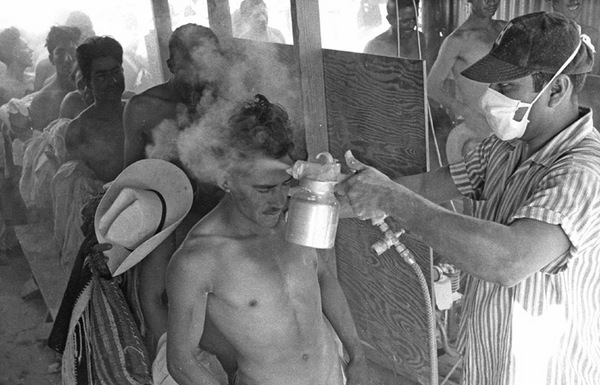
Photography by Leonard Nadel, 1956, National Museum of American History
Just imagine the following: you are on your way to work riding on the local transit system. An official enters the transit system and orders you to get off. You are taken to a facility where you are ordered to remove all your clothes. You are then doused with a disinfectant to remove any traces of a possible disease carrying organism. You are then bodily searched to ensure the organism is no longer present. Unknown to you at the time, you are being photographed, and your pictures are being distributed. How would you respond to such treatment?
Would you be as angry as Carmelita Torres was when she encountered this situation while trying to get to her job in El Paso, Texas? The year was 1917 and the mayor of El Paso had promised to do something about the “dirty lousey destitute Mexicans” coming into his city to work. The mayor’s rationale was that the Mexican workers were bringing deadly diseases into his city, although there was no proof of this.
Carmelita refused to comply and led others to engage in what became known as the Bath Riots. Many women joined Carmelita and blocked traffic. They seized trolley cars. Before long the number of protestors grew to the thousands. When officials tried to disperse the crowd, the protestors started throwing anything available at the police. The U.S. military was called in but were unable to quell the rioters. Eventually the rioters were arrested.
When businesses and households in El Paso began to complain of the lack of workers, the mayor decided to relax some of the rules. However, the situation was never resolved and eventually became worse. Soon after, the Congress passed the Immigration Act of 1917 which imposed taxes on Mexican workers coming into the U.S. and required them to pass literacy tests. The punitive actions of Congress were eventually relaxed when the U.S. entered World War I and experienced workforce shortages.
What happened to Carmelita Torres? She was arrested but went “missing” after her release. Another unforeseen impact of the mistreatment of the migrant workers stemmed from the publicity about the border officials use of the poison gas Zyklon B in gas chambers to fumigate the migrants’ clothes. In the 1930s this came to the attention of the Nazi’s, who adopted the poison gas for far worse purposes.
Just imagine how the anti-vaccine and anti-mask crowd in our society today would react to the forced dehumanizing baths imposed on immigrant workers. Would they be outraged and demand they cease? Or would they accept such practices so long as they were directed at others, like immigrants, who they deem less worthy of respect? Just imagine a world where we treat migrants with dignity as fellow humans.
* * *
“I think people should be angry at things that are worthy of anger. Injustice is outrageous and deserves outrage.” – Chris Hayes (journalist)
This is part of our “Just Imagine” series of occasional posts, inviting you to join us in imagining positive possibilities for a citizen-centered democracy.



